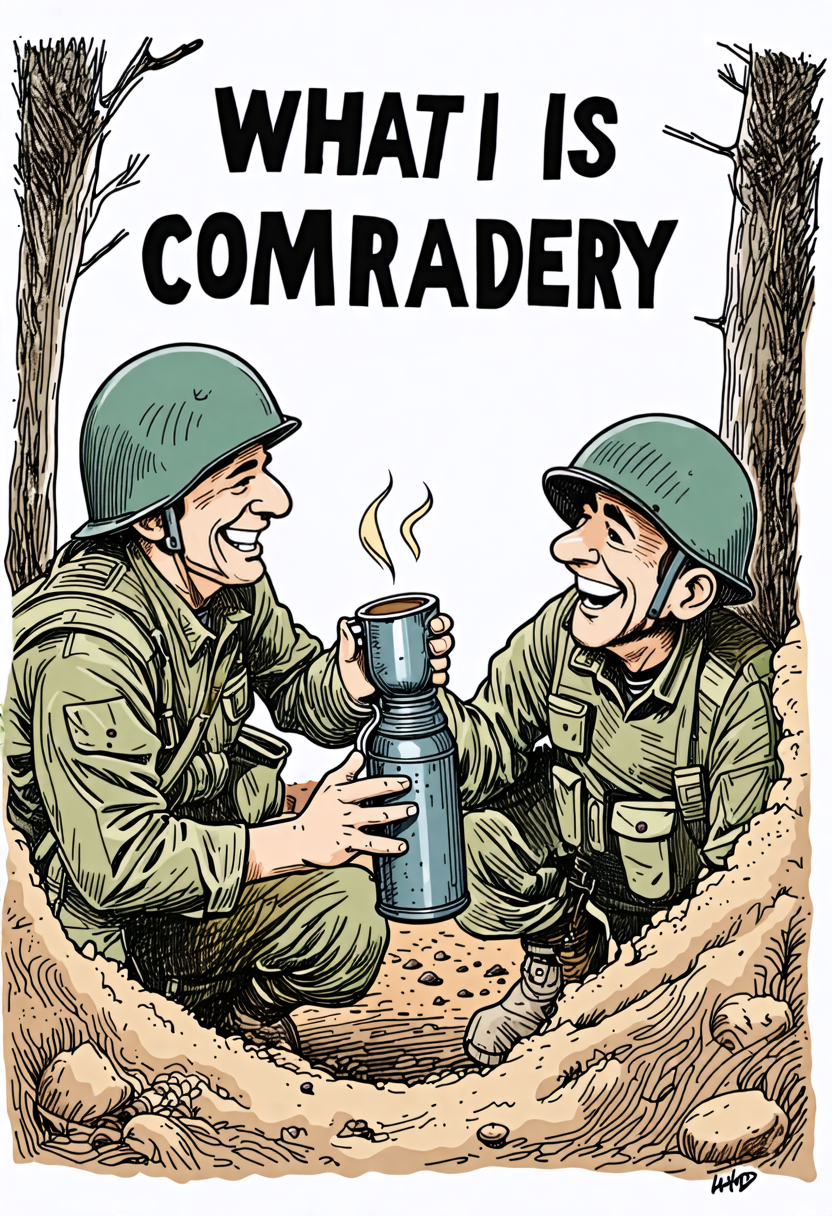What Is Comradery?
Comradery, also spelled camaraderie, originates from the French word ‘camarade’ and refers to the mutual trust and friendship among people who spend a lot of time together. This concept embodies shared experiences and collective support within groups.
Examples include sports teams where teammates work towards common goals and military units that foster trust through mutual reliance. Such bonds create a strong sense of belonging, enhance morale, and promote teamwork. Variations in pronunciation, rooted in French, do not change the essential meaning.
Origin and Spelling
The term ‘comradery,’ also spelled ‘camaraderie,’ has its origins in the French language dating back to 1835. Derived from the word ‘camarade,’ meaning ‘comrade,’ it denotes a spirit of friendship and mutual support.
Both spellings, comradery and camaraderie, are correct and used interchangeably in English. The concept embodies a sense of unity and trust among individuals in a group. It’s commonly observed in sports teams, military units, and other collaborative environments.
Comradery signifies shared experiences and a deep connection, fostering morale and cooperation. Understanding its origin and correct usage helps appreciate the profound bonds it represents. This term captures the essence of solidarity and fellowship essential for group cohesion.
Pronunciation Variations
Pronunciation variations of the term ‘comradery’ reflect its diverse usage and origins. The word has roots in the French language, which influences its pronunciation.
- Camaraderie: Often pronounced as kahm-rah-duh-ree, aligning closely with its French origin.
- Comradery: Typically pronounced as kom-rad-ree, simplifying the pronunciation for English speakers.
- Regional Differences: Variations may occur depending on the speaker’s background and region.
These pronunciation differences do not affect the word’s meaning but highlight the flexibility in its usage.
Meaning and Definition
Comradery, often spelled as camaraderie, signifies a spirit of mutual support and friendship within a group. This term originated from the French word ‘camaraderie’ in 1835. It describes the bond formed through shared experiences and mutual respect.

Comradery is characterized by a sense of belonging and trust among group members. It is commonly observed in close-knit communities such as sports teams and military units, where individuals rely on each other for support and encouragement. The essence of comradery lies in the unity and cooperation it fosters, leading to strengthened relationships and high morale.
Sports Team Examples
In sports teams, comradery manifests through the mutual support and collective spirit shared among teammates. This bond is essential for a team’s success and overall morale. By fostering a sense of belonging and unity, athletes can perform at their best and overcome challenges together.
Examples of comradery in sports teams include:
- Shared Goals: Team members work towards common objectives, creating a united front.
- Encouragement: Players uplift each other during practice and competitions, boosting confidence and resilience.
- Trust: Teammates rely on one another, building a foundation of mutual respect and loyalty.
Military Unit Examples
Within military units, comradery is critical for fostering trust and mutual support among soldiers. This bond is essential for operational success and morale. Soldiers often form deep connections through shared experiences, challenges, and responsibilities. This sense of unity can be observed in various military formations, including platoons, squads, and battalions.
| Unit Type | Description | Role in Comradery |
|---|---|---|
| Platoon | 30-50 soldiers | Close-knit support and teamwork |
| Squad | 8-12 soldiers | Immediate mutual reliance |
| Battalion | 300-800 soldiers | Broader sense of unity and trust |
Characteristics of Comradery
Beyond the structured bonds of military units, comradery thrives on several key characteristics that define its essence. These traits are pivotal in fostering a strong sense of unity and support within any group setting.
- Shared Experiences: Common challenges and triumphs create strong bonds.
- Mutual Respect: Recognizing and valuing each other’s contributions enhances trust.
- Sense of Belonging: Feeling part of a group fosters commitment and loyalty.
Comradery is not limited to any specific environment; it can flourish in sports teams, workplaces, and social organizations. These characteristics ensure that individuals feel connected, supported, and motivated, which is vital for collective success.
Roller Derby Case Study
How does the roller derby exemplify the profound sense of comradery found in team sports?
Roller derby teams showcase comradery through mutual support and trust. Each member relies on their teammates for safety and success. The sport’s physical intensity requires strong bonds and clear communication. Players train together, share strategies, and motivate each other. This creates a unique sense of unity and belonging. Off the track, their friendships often deepen, extending beyond the sport itself.
Roller derby also promotes inclusivity, welcoming diverse participants. This inclusiveness strengthens the sense of community and mutual respect.
Political Associations
The term comradery, derived from ‘comrade,’ has significant historical and political associations, particularly linked to communist ideologies. In political contexts, ‘comrade’ denotes a fellow member of a political group, especially within communist and socialist movements. This usage emphasizes unity, equality, and mutual support among members.
- Communist Movements: Comradery is often seen in communist parties, where members refer to each other as ‘comrades.’
- Socialist Groups: Socialist organizations use the term to foster a sense of solidarity and collective effort.
- Revolutionary Contexts: During revolutions, comradery among participants boosts morale and maintains unity against opposition.
Synonyms of Comradery
While comradery has strong political ties, it also shares similarities with numerous other terms that describe unity and friendship. Synonyms such as bonhomie, brotherhood, and companionship capture the essence of mutual support and shared experiences.
Conviviality and comradeship highlight the friendly and social aspects of group interactions. Friendship and fellowship underline the personal bonds that form within a group, fostering trust and mutual respect. These terms collectively describe a spirit of togetherness that enhances morale and cohesion.
Antonyms and Impact
Understanding the antonyms of comradery reveals the detrimental effects of a lack of unity and support within a group. Words like bad blood, dislike, loneliness, and lonesomeness point to negative emotions and isolation.
When comradery is absent, the group’s morale can suffer greatly. This can lead to decreased motivation and poor performance. The impact of low comradery includes:
- Decreased morale: Without mutual support, enthusiasm wanes.
- Increased conflicts: Lack of unity fosters misunderstandings and disputes.
- Isolation: Individuals feel disconnected and unsupported.







